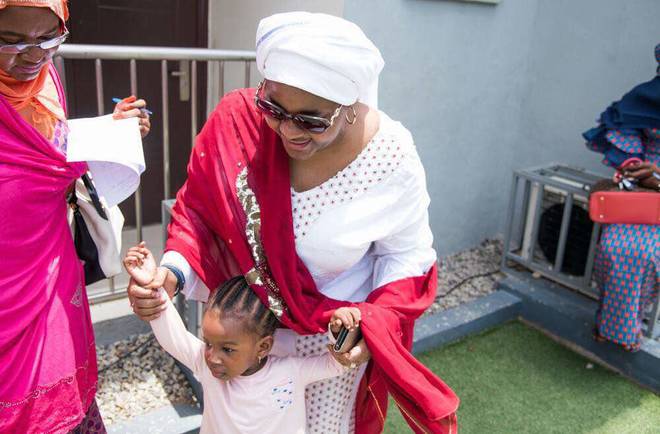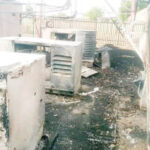
By Olayemi John-Mensah & Taiwo Adeniyi
Internally Displaced Persons (IDPs) at various camps within Abuja have said they often go to bed hungry despite receiving relief materials from non-governmental organisations, philanthropists, corporate organisations and other individuals.
The displaced persons, in their thousands, from the north eastern part of the country, are scattered across 14 camps at various locations in the Federal Capital Territory (FCT).
Some of them, who spoke to our reporters at the New Kuchingoro camp, said the only thing on their mind now is to return to their communities in Gwoza Local Government Area of Borno State, stressing that there is no place like home.
Solomon Benjamin who has been in the camp since 2014 said it has not been easy living there, adding that government has abandoned them.
“Since we came here, NEMA and FEMA visited us twice each with some foodstuff and other relief materials.
“Red Cross also came once with milk which they shared among the children. Most of the gifts we receive were from churches, public-spirited Nigerians and some organisations that come here from time to time, especially during festive seasons like this,” he said.
Solomon who appreciated those that have donated to them, said everything they gave them was shared equally among all the households while cooked food was shared among the youths.
The displaced persons also said they contend with people who were not displaced but lurk around to also partake of the relief materials.
“We have never heard of any crisis from Kaduna, Plateau and Bauchi states but we have people from these states that call themselves IDPs and they are always causing trouble whenever items are brought here. When people bring items they will always struggle and fight with us.
“Olumba Olumba brought about 400 bags of rice, 1000 tubers of yam, oil, sugar and many other items but they came and fought us and one of us was injured in the process,” he said.
One of the women at the camp, Mrs Elizabeth Sunday, said God has been sending people to help since they came to the camp, adding that anything they brought is shared equally among the households.
Mrs Sunday said, the government has not done much because all the displaced people keep thinking the government will find solution to the insurgency so that they can return home.
“Everything is difficult here; but for relief materials coming from people, the suffering will be too much. And but for an individual that provided school for the children, our children wouldn’t have been going to school,” she also said.
Another woman, Saratu Philemon, urged government to come to their aid and look for a way of returning them to their communities. She said all they wanted was for peace to reign because they are peace loving people.
Ibrahim Musa who has been in the camp since 2015 said, most of the help they get come from churches and organisations, and complained that government has abandoned them while the senator representing them does not care about their existence.
The situation was not different at Durumi camp. The spokesman at the camp, Umaru Ali, said the displaced persons lacked enough food, a situation which, he said, has forced them into employing several means of survival including commercial motorcycle riding, plumbing, security guards, welding and other menial jobs.
He said though they get relief materials from non-governmental organisations and well-meaning Nigerians, such items do not come often.
“The last NGO that was here came three months ago. It sometimes takes four months interval,” he said, adding that people, especially married people, at the camp have to “hustle by engaging in many menial jobs.”
He alleged that government has been insensitive to their plights as they rarely received relief items from government or its agencies.
While their desire for food remains unmet, they also grapple with poor accommodation. He said they are at the mercy of land owners, whom, he said chased them around.
The few that got a space could only erect a shanty made from polythene bags, tarpaulin, used cartons and abandoned corrugated roofing sheets.
“We sleep inside tents with our families,” Ali said adding that people with larger families face stiffer challenges of feeding and accommodation.
“I sleep in a small tent with my husband and seven children,” said Saratu Joshua, one of the women at the camp. She said she could only enrol four of her children in school while three are out of school.
The jobless woman said she relies on the money her children made by selling sachet water after returning from school and the little her husband gets from doing menial jobs.
Unlike Saratu, Sadiya Habeeb weaves caps as a means of livelihood. Despite the vocation, she still struggles to assist her husband in meeting the needs of their four children.
“I get the needle, thread and other materials that I need to weave the cap from someone else. After weaving I will give the cap to the person who will now give me N5,000,” she said through an interpreter. With her attention on the cap and a baby strapped to her back, she said they do not know how or if they would eat before going to bed, she told our reporters.
She said it takes more than one month to finish weaving a cap making it difficult to live on her earnings.
“Before I finish another cap I must have exhausted the money I made from the previous one,” she said adding that she has been living from hand to mouth for more than three years.
Sadiya, her husband and four children sleep in a small tent in another open space few metres from Saratu.
Sadiya and three other women sit under a tent watching as their children played around the camp. The children, they said, also feel the pressure about their situation.
The toilet and bathroom are situated few metres from the dilapidated tents they sleep in.
During the dry season, they are not spared from termites while heavy rains always threatened their continued stay at the camp during the wet season.
“The weather is now cold and we sleep in a place like that,” Katum Abdullahi, one of the women said.
Ali said about 14 people have died at the camp since its establishment about four years ago. He attributed some of the deaths to poor living conditions and inability to afford quality healthcare services.
One of the women that helplessly watched her son die, Katum Abdullahi, said life has not been easy since she left Gwoza three years ago.
She said she lost her son because she could not afford quality healthcare. “The baby was always falling sick and whenever we went to the hospital, we didn’t usually have money for drugs,” she said.
Katum said she got to the camp with her son healthy but that he died six months later. She said the child would have been alive today if she had enough money to take care of him.
She expressed hope that a similar fate would not occur to her second son who is less than one year old.
She said the food they receive from donors do not last more than three days due to the large number of people at the camp.
A document endorsed by the chairman of the displaced persons and the group’s secretary, Ibrahim Ahmadu and Bala Yusuf respectively, which was made available to Aso Chronicle showed that there are 2,740 people at the camp with majority from Borno State while people from Yobe and Adamawa states were only 725 of the total population.
The document showed that about 130 men in the camp were engaged in menial job while 180 women are into different businesses including tailoring, production of liquid soap, powder and selling food.
Umaru Ali said the displaced persons have a school but lacked books while the primary healthcare centre lacks sufficient drugs. He however commended the police for ensuring peace in the community.




